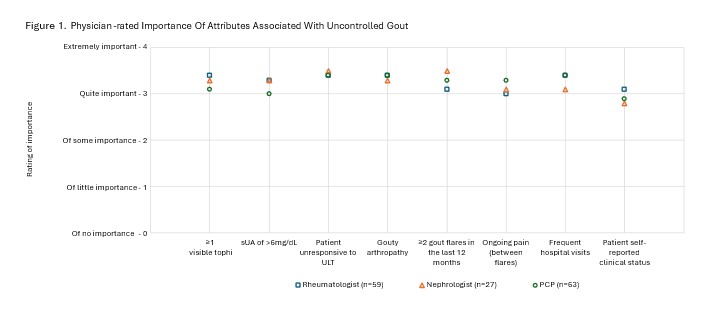Session Information
Session Type: Poster Session C
Session Time: 10:30AM-12:30PM
Background/Purpose: Managing uncontrolled gout (UG) can involve a multi-disciplinary approach involving physicians of different specialities, all of whom may have differing perspectives or approaches for management of the condition due to the complex clinical manifestations and comorbidities. An understanding of physician perspectives of gout management across different physician specialties may help to improve education and patient care. This study evaluated physicians’ perspectives of UG and gout management practices.
Methods: Data was extracted from the Adelphi Real World Gout Disease Specific Programme (DSP)™, a cross-sectional survey (with retrospective data collection) from rheumatologists, nephrologists and PCPs in the United States from August 2023 – March 2024. Physicians who participated in this study managed ≥ 8 patients with gout in a month with urate lowering therapy (ULT). Physicians’ perspectives obtained on UG included importance of different attributes in defining UG (where 0 was of no importance and 4 was extremely important); factors contributing to UG development; management of gout (including UG): use of treat to target (T2T), diagnostic and monitoring tests; and remission. Analyses were descriptive.
Results: Overall, 59 rheumatologists, 27 nephrologists and 63 PCPs participated in the study.Physicians across specialities rated most attributes associated with UG with an importance of 3-3.5 out of 4 (Figure 1). Overall, non-response to ULT and presence of gouty arthropathy were rated the most important (with an overall mean score of 3.4 across all physicians).The top factor contributing to UG reported by rheumatologists was lack of patient adherence to medicine regimen (46%), whereas adherence to diet/lifestyle advice was the top reason reported by nephrologists (37%) and PCPs (43%) (Figure 2).To monitor clinical manifestations of their UG patients, test use varied across physician types. Tophi size measurement was used by 56% of rheumatologists, 37% of nephrologists and 48% of PCPs. C-reactive protein tests were used by 53%, 37%, 35% and synovial fluid aspiration by 15%, 11% and 5% respectively, whilst sUA levels were monitored by >80% physicians regardless of speciality.When looking at treatment response, T2T was reported to be used in all patients with gout by 59% of rheumatologists, 41% of nephrologists and 40% of PCPs.With regard to possibility of remission of gout and UG, 42% of rheumatologists reported that remission was possible in all patients with gout, as opposed to 26% of nephrologists and 35% of PCPs.
Conclusion: There was variation in perceptions of UG and gout management practices amongst physician specialties, which may come from differences in training and experience with managing patients with uncontrolled gout. Future research initiatives which focus on education, adherence to guidelines, intensive management (T2T), monitoring, and remission as a goal may standardize care among specialties and may improve patient outcomes.
 Frequent hospital visits: >2 annually. Gouty arthropathy: defined clinically or radiographically as joint damage due to gout. sUA: serum uric acid, PCP: primary care physician, UG: uncontrolled gout, ULT: urate lowering therapy.
Frequent hospital visits: >2 annually. Gouty arthropathy: defined clinically or radiographically as joint damage due to gout. sUA: serum uric acid, PCP: primary care physician, UG: uncontrolled gout, ULT: urate lowering therapy.
.jpg) PCP: primary care physician, UG: uncontrolled gout
PCP: primary care physician, UG: uncontrolled gout
To cite this abstract in AMA style:
Botson J, Bhor M, Meyer N, Edwards M, Goddard E, Barton V, Peterson J. A Real-World Survey On Physicians’ Perspectives Of Uncontrolled Gout And Gout Management Practices. [abstract]. Arthritis Rheumatol. 2025; 77 (suppl 9). https://acrabstracts.org/abstract/a-real-world-survey-on-physicians-perspectives-of-uncontrolled-gout-and-gout-management-practices/. Accessed .« Back to ACR Convergence 2025
ACR Meeting Abstracts - https://acrabstracts.org/abstract/a-real-world-survey-on-physicians-perspectives-of-uncontrolled-gout-and-gout-management-practices/
